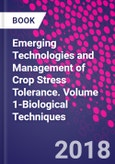Emerging Technologies and Management of Crop Stress Tolerance: Volume 1 - Biological Techniques presents the latest technologies used by scientists for improvement the crop production and explores the various roles of these technologies for the enhancement of crop productivity and inhibition of pathogenic bacteria that can cause disease.
This resource provides a comprehensive review of how proteomics, genomics, transcriptomics, ionomics, and micromics are a pathway to improve plant stress tolerance to increase productivity and meet the agricultural needs of the growing human population. This valuable resource will help any scientist have a better understanding of environmental stresses to improve resource management within a world of limited resources.
Table of Contents
1. Genomic Approaches and Abiotic Stress Tolerance in Plants 2. Metabolomics role in Crop improvement 3. Transcription Factors and Environmental Stresses in Plants 4. Plant Resistance Under Cold Stress: Metabolomics, Proteomics and Genomic Approaches 5. Genetic Engineering of Crop Plants for Abiotic Stress Tolerance 6. Bt Crops: A Sustainable Approach Towards Biotic Stress Tolerance 7. Modern Tools for Enhancing Crop Adaptation to Climatic Changes 8. Interactions of Nano-particles (NPs) with Plants: An Emerging Prospective in Agriculture Industry 9. Role of miRNAs in Abiotic and Biotic Stresses in Plants 10. Gene Silencing: A Novel Cellular Defence Mechanism Improving Plant Productivity Under Environmental Stresses 11. The Role of Carbohydrates in Plant Resistance to Abiotic Stresses 12. Role of Glucosinolates in Plant Stress Tolerance 13. Plant responses to Iron (Fe), Manganese (Mn) and Zinc (Zn) deficiency stress 14. Role of Trace Elements in Alleviating Environmental Stress 15. Nutritional Stress in Dystrophic Savanna Soils of the Orinoco Basin: Biological Responses to Low N and P Availabilities 16. Silicon and Selenium: Two vital trace elements that confer abiotic stress tolerance to plants 17. Herbicides, pesticides and plant tolerance: An overview 18. Effects of Humic Materials on Plant Metabolism and Agricultural Productivity 19. Climate Change and Potential Impacts on Quality of Fruit and Vegetable Crops 20. Interplays of Plant Circadian Clock and Abiotic Stress Response Networks 21. Development of Water Saving Technique for Sugarcane (Saccharum officinarum L.) Under Arid Environment of Punjab, Pakistan








